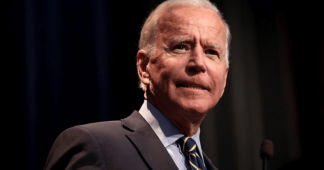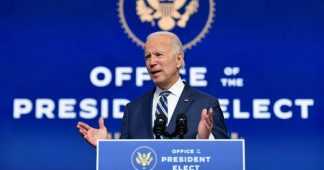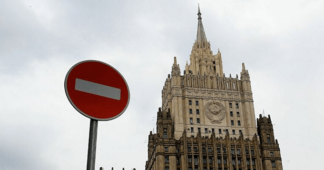Posted on
The chaotic end to the U.S. mission in Afghanistan has produced an abundance of recriminations. Some of them are warranted, even though the dominant motive in nearly all cases is little more than crude blame shifting. Joe Biden and his foreign policy team certainly can be faulted for spectacularly mismanaging the final stage of the US troop withdrawal. The president’s comments on July 8 emphatically disputing predictions that the Taliban would quickly overrun Afghanistan did not enhance his reputation for accurate insights. It is hardly a good sight to see US helicopters conducting evacuation flights of diplomats from the American embassy in Kabul – an image all-too-reminiscent of Saigon in 1975.
But the intensifying campaign to assign blame goes far beyond complaints about handling the withdrawal. GOP partisans and the ever-opportunistic neocons are attempting to make Biden responsible for the entire fiasco of the failed mission in Afghanistan. As a corollary, they push the insidious and absurd argument that if the United States had just stayed the course for a few more years (or decades), Washington’s Afghan intervention eventually would have succeeded.
In reality, the ineffectual and corrupt nation-building crusade was doomed from the start. Drawing on the Soviet Union’s bitter experience in Afghanistan during the 1970s and 1980s trying to prop-up its communist client, Mikhail Gorbachev recently emphasized that point. Yet in their arrogance, US officials failed to learn from Moscow’s bloody, frustrating sojourn in that country. The administrations of Donald Trump, Barack Obama, and (especially) George W. Bush deserve far more blame than the Biden administration for the Afghanistan fiasco. Former President Bush had the temerity to denounce the idea of a US troop withdrawal from Afghanistan despite the passage of nearly two decades, the expenditure of some $2 trillion, and the loss of more than 2,400 American lives.
Fareed Zakaria put his finger on an especially important reason for the failure of the US mission. The legitimacy of the U.S.-backed government “was crippled because it survived only thanks to the support of a foreign power. Afghan identity is closely tied to resistance against foreign invasion, particularly the invasion of infidels. (Afghan history glorifies the century-long struggle against the British and the jihad against the godless Soviet Union.) It is easy to use these tropes to mobilize nationalism and religious devotion, which powerfully fuel the will to fight and die.” The Taliban used that formula to perfection. Yet three successive administrations before Biden entered the White House falsely portrayed the weak and corrupt Afghan government as both democratic and effective. Given such a sustained disinformation campaign, it is understandable why the regime’s abrupt collapse shocked the American people.
Nevertheless, critics denounce Biden for “abandoning” or “betraying”
America’s “allies” in Afghanistan. The most frequent example given is the Taliban’s likely retaliation against translators and other Afghans who worked with the United States during the two-decade occupation. In many cases, though, the implication is that the Afghan government itself was an important ally that the administration foolishly jettisoned – to the detriment of America’s reputation around the world. Other critics focus on the probable dismal future of women in Afghanistan under Taliban rule and argue that Biden’s troop withdrawal callously consigned them to a terrible fate, violating a moral obligation to prevent such an outcome.
Some interventionist addicts even want renewed US military involvement in Afghanistan, either by boosting the number of troops being used to evacuate Americans stuck in that country or by participation in a new UN “peacekeeping mission.” Either move would be the essence of folly, since it would again mire the United States in the country’s turmoil. The ever-hawkish Danielle Pletka from the American Enterprise Institute states bluntly that “we will inevitably find ourselves back in Afghanistan.” If policymakers foolishly listen to Pletka and her neocon allies, that outcome might very well happen.
Indeed, what appears to trouble the national security establishment the most is that Biden may be drawing a broader foreign policy lesson from the bruising experience in Afghanistan. In his August 16 address to the nation, the president stated: “Our mission in Afghanistan was never supposed to have been nation-building. It was never supposed to be creating a unified, centralized democracy. Our only vital national interest in Afghanistan remains today what it has always been: preventing a terrorist attack on American homeland. I’ve argued for many years that our mission should be narrowly focused on counterterrorism, not counterinsurgency or nation-building. That’s why I opposed the surge when it was proposed in 2009 when I was vice president.” He added: “I will not repeat the mistakes we’ve made in the past. The mistake of staying and fighting indefinitely in a conflict that is not in the national interest of the United States, of doubling down on a civil war in a foreign country, of attempting to remake a country through the endless military deployments of U.S. forces.”
Such comments come perilously close to outright heresy as far as America’s foreign policy blob is concerned. The growing bipartisan hostility to Biden’s decision to terminate the US military mission in Afghanistan suggests that a set of powerful, pro-war vested interests now feel threatened. Even CNN and the rest of the usually sycophantic mainstream media have turned noticeably more critical of the administration in recent days. Given the longstanding close collaboration of those outlets with the Pentagon and the intelligence community, such a reaction constitutes a warning to the president that any flirtation with a new foreign policy that avoids nation-building crusades jeopardizes his effectiveness in office and his political future. Given the stakes to the military-industrial complex, the pro-war political establishment, and their media allies, the campaign to scapegoat Biden for the Afghanistan debacle likely will intensify. Opponents of Washington’s toxic global military adventurism must not fall for that ploy.
* Ted Galen Carpenter, a senior fellow in defense and foreign policy studies at the Cato Institute, is the author of 12 books and more than 950 articles on international affairs.
Published at original.antiwar.com











